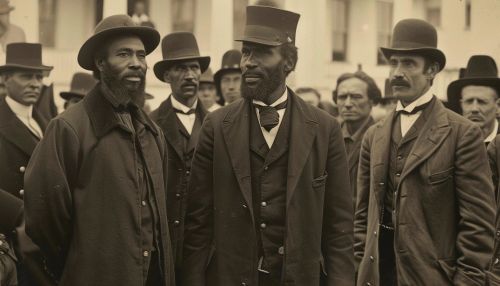Emancipation Proclamation: Difference between revisions
(Created page with "== Background == The Emancipation Proclamation was a significant executive order issued by President Abraham Lincoln during the Civil War in the United States. It declared that all enslaved people in the Confederate-held territory were to be set free. This did not end slavery in the Union-held border states or in the areas of the Confederacy that had already been placed under Union control. The practical effect of the Proclamati...") |
No edit summary |
||
| (One intermediate revision by the same user not shown) | |||
| Line 2: | Line 2: | ||
The Emancipation Proclamation was a significant executive order issued by [[Abraham Lincoln|President Abraham Lincoln]] during the [[American Civil War|Civil War]] in the United States. It declared that all enslaved people in the Confederate-held territory were to be set free. This did not end slavery in the Union-held border states or in the areas of the Confederacy that had already been placed under Union control. The practical effect of the Proclamation was to give the Union a new war aim, in addition to its original goal of reuniting the Union. | The Emancipation Proclamation was a significant executive order issued by [[Abraham Lincoln|President Abraham Lincoln]] during the [[American Civil War|Civil War]] in the United States. It declared that all enslaved people in the Confederate-held territory were to be set free. This did not end slavery in the Union-held border states or in the areas of the Confederacy that had already been placed under Union control. The practical effect of the Proclamation was to give the Union a new war aim, in addition to its original goal of reuniting the Union. | ||
[[Image:Detail-79037.jpg|thumb|center|Historical document of the Emancipation Proclamation|class=only_on_mobile]] | |||
[[Image:Detail-79038.jpg|thumb|center|Historical document of the Emancipation Proclamation|class=only_on_desktop]] | |||
== Proclamation Development == | == Proclamation Development == | ||
Latest revision as of 16:21, 16 May 2024
Background
The Emancipation Proclamation was a significant executive order issued by President Abraham Lincoln during the Civil War in the United States. It declared that all enslaved people in the Confederate-held territory were to be set free. This did not end slavery in the Union-held border states or in the areas of the Confederacy that had already been placed under Union control. The practical effect of the Proclamation was to give the Union a new war aim, in addition to its original goal of reuniting the Union.


Proclamation Development
The Emancipation Proclamation was developed over time, with Lincoln carefully considering the legal, military, and moral implications of such a proclamation. Lincoln's initial reluctance to issue the Proclamation stemmed from his concerns about its constitutionality and its potential to alienate border states that had remained loyal to the Union. However, as the war progressed, he became increasingly convinced of the necessity of ending slavery as a war measure.
Content of the Proclamation
The Emancipation Proclamation consists of two executive orders. The first, issued on September 22, 1862, declared that if the Confederate states did not cease their rebellion by January 1, 1863, then Proclamation would go into effect. When the Confederacy did not yield, Lincoln issued the final Emancipation Proclamation on January 1, 1863. This order declared "that all persons held as slaves" within the rebellious states "are, and henceforward shall be free."
Impact
The Emancipation Proclamation had a profound impact on the Civil War and the future of the United States. While it did not immediately free a single slave, it fundamentally transformed the character of the war. After January 1, 1863, every advance of federal troops expanded the domain of freedom. Moreover, the Proclamation announced the acceptance of black men into the Union Army and Navy, enabling the liberated to become liberators. By the end of the war, almost 200,000 black soldiers and sailors had fought for the Union and freedom.
Legacy
The Emancipation Proclamation has been the subject of much debate and controversy. While some argue that it did not go far enough in abolishing slavery, others argue that it was a crucial step towards the eventual abolition of slavery with the Thirteenth Amendment. Regardless of the differing views, the Emancipation Proclamation remains a significant document in the history of the United States.
